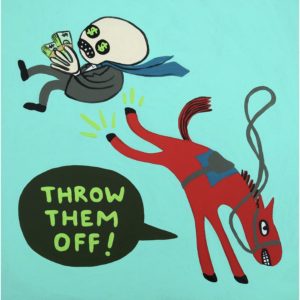
When we talk about the need to transform society to one that isn’t dominated by capitalism, there are various verbs that offer themselves, each with its own nuances of meaning that map distinct action pathways.
Do we “end” capitalism? I like this verb for its broad open-endedness, its ability to encompass the totality of all the different aspects of the mode of production that need to cease. But the shadow side of this word is its shapeshifting ambiguity — it could also shrink its meaning to imply that capitalism is a bad behavior that we could just decide to stop doing, or a policy that could be abolished through an act of will.
Which brings us to the phrase Abolish Capitalism — which has a formal institutional vibe that doesn’t resonate with me very much, as if it’s saying that it could be ended by a legal maneuver, by decree. And we all know that The Law is capitalist law, so that’s not happening.
Transforming capitalism is just reforming it, so I don’t like that word used that way. But to transform society away from or beyond capitalism — that works.
Overthrow is a frequently employed verb, describing the removal of the ruling class from power. It refers specifically to the political field, so what about the rest? Capitalism has invaded/overtaken/harnessed not just politics but all areas of human life: culture, ideology, spirituality — and it’s specifically rooted in the economy. The word “overthrow” doesn’t speak directly to that. BUT — taking the economy out of capitalist control (seizing the means of production) is not just confined to the economic field but also ecompasses a political act. It is a fight for the power to decide how society’s needs will be met. In order to take over the economy, the working class will have to conquer political power — this is why the political conflict is said to be the “principal contradiction” of a class-divided society. Its the battle that needs to be won in the superstructure as a condition of the fundamental contradiction being addressed in the economic base.
Sometimes I use the phrase “kill capitalism” as an emotionally charged and very simple expression of hostile antagonism. The verb “kill” reverberates with the implication that capitalism is alive. While perhaps capital isn’t a sentient being, it does have its own self-propelled motion, its own life in a sense, independent from human will. (Which is why overthrowing the capitalist ruling class, while necessary, won’t be enough to actually put an end to capitalism — even though it’s an important step that can’t be avoided).
“Smash” or “crush” serve to communicate hostile antagonism too. I liked these words better when I was younger for some reason (haha). Now I feel that they’re kind of one-sided, that they carry an aura of nihilism. Like the prospect of capitalism collapsing with no organized counterforce arising to replace it as a better structure for human society, thus leaving the field open for exploiters and oppressors to reorganize, the non-class-conscious contexts in which these verbs are often used bring to my mind a chaotic and uncontrolled slide into even worse widespread violent misery. (Should the words be asserted by working class-led organizations, though, my misgivings would transform into excited hope).
I really like the totality and grit expressed in “overcome,” though I’m uneasy with the lack of class antagonism in that word, as if capitalism is a problem we can solve within ourselves, like shaking an addiction or climbing a mountain.
I’m constantly looking for ways to express in combination the deliberate ending of capitalism intertwined with the rising of lifeways that allow for a thriving world. “Transformation” is what I gravitate to (referring not to capitalism of course, but to human society as a whole). Even that nice big word doesn’t really encompass the whole thing exactly the way I’d like to express it, though.
Maybe that’s where metaphors and images come in.
